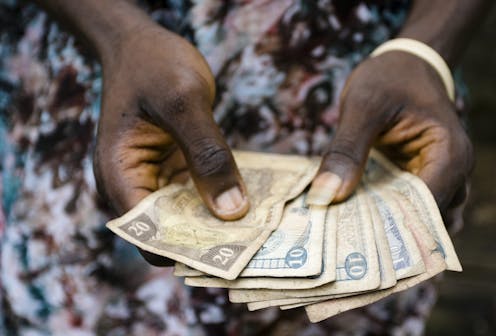Giving people money with no strings attached is good for their health, dozens of studies indicate
- Written by Sze Yan Liu, Assistant Professor of Public Health, Montclair State University

The Research Brief[1] is a short take about interesting academic work.
The big idea
When people living in poverty in countries like Malawi, Indonesia and Ecuador receive cash payments[2] without having to do anything in return, they have better health, according to a scientific review of a large body of research.
To reach that finding, our interdisciplinary team of public health[3] experts[4], economists[5] and[6] epidemiologists[7] from Canada, Germany, New Zealand and the U.S. pooled data from 34 studies that involved 1,140,385 participants in 50,095 households across Africa, the Americas and Southeast Asia.
Our systematic review and meta-analysis[8] also determined that unconditional cash payments[9] in low- and middle-income countries not only reduce poverty, but they also lead to greater food security[10], improved nutrition and more consistent school attendance.
Follow-up surveys with individuals who received this money earlier found that they were less likely to have been sick in the previous two weeks to three months compared to individuals who did not received this money. In addition, there is some evidence that people who got cash payments spent more money on health care.
The studies we examined involved 24 different cash payment programs in 13 countries that were run either by governments, nonprofits or researchers. The value of the money given to people in need varied widely, equaling anywhere from 1.3% to 81.9% of gross domestic product per capita[11].
Why it matters
Governments, nonprofits and researchers around the world are increasingly experimenting with a simple approach to reduce poverty: giving people money[12] to spend on whatever they need.
Many of these cash-transfer pilots and experiments – often called basic income programs[13] – have required people to do something[14] to receive the money, such as making sure their children regularly attend school. Sometimes the condition involves completing a specific health-related task, such as attending a health education workshop or going to a preventive care medical appointment.
Researchers are debating whether these conditions improve[15] or hinder the effectiveness of these programs[16].
Other programs, like those we studied, have no such requirements.
One advantage of the no-strings-attached approach, argue the GiveDirectly nonprofit[17] and other supporters, is that it eliminates the need to monitor compliance and slashes administrative costs[18]. Unconditional cash payments may empower recipients more since they can decide how to use the money[19] to meet some of their immediate needs.
Making payments contingent on people meeting requirements may also unintentionally harm people in need who can’t comply with conditions[20] due to physical, social and economic barriers. For example, requiring a clinic visit to “earn” a cash payment does not help anyone unable to make the trip.
What still isn’t known
We still don’t have enough information to determine if this pattern holds true in the United States and other wealthier nations.
The long-term health benefits of unconditional cash payments is also not clear.
Finally, more research is needed to understand whether the impetus for these programs, such as when they follow a hurricane or other major disaster, makes any difference[21].
What’s next
Our team plans to study whether cash-payment programs that require compliance with conditions lead to better health too. We also want to update a previous review we conducted of payments given to people who had experienced humanitarian disasters[22] to include evaluations of similar efforts carried out during the COVID-19 pandemic.
[Like what you’ve read? Want more? Sign up for The Conversation’s daily newsletter[23].]
References
- ^ Research Brief (theconversation.com)
- ^ receive cash payments (doi.org)
- ^ public health (scholar.google.com)
- ^ experts (scholar.google.com)
- ^ economists (scholar.google.ca)
- ^ and (scholar.google.co.nz)
- ^ epidemiologists (scholar.google.ca)
- ^ meta-analysis (himmelfarb.gwu.edu)
- ^ unconditional cash payments (www.opml.co.uk)
- ^ food security (theconversation.com)
- ^ 1.3% to 81.9% of gross domestic product per capita (data.worldbank.org)
- ^ giving people money (money.usnews.com)
- ^ basic income programs (www.vox.com)
- ^ required people to do something (blogs.worldbank.org)
- ^ whether these conditions improve (doi.org)
- ^ hinder the effectiveness of these programs (doi.org)
- ^ GiveDirectly nonprofit (www.givedirectly.org)
- ^ slashes administrative costs (www.povertyactionlab.org)
- ^ decide how to use the money (doi.org)
- ^ can’t comply with conditions (doi.org)
- ^ makes any difference (gh.bmj.com)
- ^ payments given to people who had experienced humanitarian disasters (doi.org)
- ^ Sign up for The Conversation’s daily newsletter (memberservices.theconversation.com)







